Animal Feces Cleanup in Fort Lauderdale, Miami, and More
All animals have droppings, and when those droppings accumulate indoors or in large quantities, animal feces cleanup becomes essential.
In small amounts, like when picking up after a dog outside, those droppings are unlikely to cause many health hazards – especially if you wash your hands afterwards. But animal waste is filled with bacteria, viruses, fungi, and other compounds.
When these feces are allowed to linger, or they are in an enclosed space, or the feces buildup is extensive, it can lead to considerable problems for both your property and your health.
Rescue Clean 911 provides animal feces cleanup in South Florida, in addition to a range of restoration services to return properties to like-new condition. Our animal waste cleanup can be performed as a single service or alongside any of the other cleanup and restoration services, and we are always available to offer guidance on what solutions are best for your property.
To learn more about our cleanup options, give us a call at (561) 782-1392 for rapid support or fill out our online form, and one of our team members will contact you to discuss your quote.
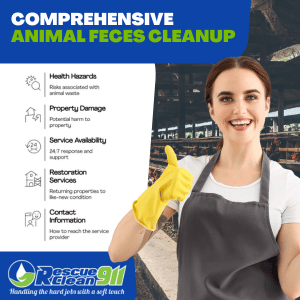
Jump to a section:
Contact Us Today
Why Choose Rescue Clean 911 for Animal Feces Cleanup
Based in Fort Lauderdale, Rescue Clean 911 is dedicated to helping properties in Dade, Broward, Palm Beach, St. Lucie and Martin County region return to a state that is safe, clean, and comfortable after a disaster, unexpected event, or ongoing struggle with hoarding or neglect.
We specialize in removing animal poop, cat poop, rodent waste, and other types of pet waste that can accumulate in unsanitary conditions.
A dangerous amount of animal feces in a property can result from a number of situations, all of which we can handle through our comprehensive pet and wildlife feces removal services.
All of our services are:
Fairly Priced – We use professional and transparent estimating software that provides a competitive rate based on the type of cleanup and the standards in the local area so that you are getting the best possible rates. If you are working with insurance for your property cleanup, we can often work within the restrictions of what insurance will cover while still cleaning the property.
Experienced – With a founder who was a firefighter, paramedic, and registered nurse to the individual backgrounds and training of each of our staff, Rescue Clean 911 brings decades of combined experience to every project. We have seen many of the issues with animal feces and different properties that they might face before, and we know the most effective ways to clean and restore the property safely.
Technologically Focused – Recent advancements in technology have made cleanup safer and more successful than ever before. We maintain an inventory of the latest devices, as well as equipment that has been proven effective over decades of use.
We are an IICRC-certified company and adhere to all of the standards put forth by the IICRC regarding the protocols for cleaning and restoring all elements of a property.
These standards include the necessary safety measures and the most efficient ways to restore different surfaces. We take into account health risks associated with every rodent infestation to ensure thorough decontamination.
We also consider animal feces a form of biohazard waste since it can spread a variety of diseases, including infectious diseases. As with all of our biohazard services, we follow OSHA and state regulations for the proper handling and removal of any contaminants.
These industry standards are only the beginning of our commitment to safety. At Rescue Clean 911, we believe that these are the minimum requirements to complete a property clean-up project effectively and with minimal risk to those on the property. We also help implement preventative measures to reduce the risk of future infestations.
In addition to consistently meeting these standards, we also approach animal waste cleanup situations with professionalism, understanding, and respect for your home or business.
Many events that result in a need for excrement cleanup are emotionally charged, and any instance where your property or health is threatened is stressful.
When you trust Rescue Clean 911 to restore your property to a livable condition, we make the process as simple and worry-free as possible. Schedule your free consultation with our experts today!
Animal Feces Buildup – Causes and Solutions
There are many situations that can cause different types of animal feces to become challenging enough that professional cleanup is beneficial. All animal waste is considered a biohazard, but certain situations can increase the risk to your household or commercial property even further.
At Rescue Clean 911, we also know the most advanced cleaning methods that enable us to address all the challenges caused by animal feces, both the visible mess and the microscopic germs and odor-causing bacteria that cling to the surface.
We also know how to address many of the potential issues that lead to feces buildup. Whether the animal feces are the only issue or part of a larger cleanup process, we tailor our approach to provide a process that is safe, fast, and effective. Some of the situations that can lead to the buildup of animal waste include:
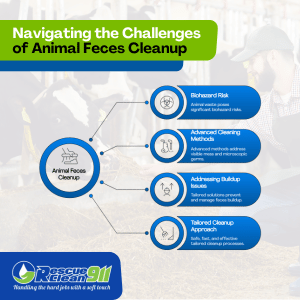 Hoarding
Hoarding
Hoarding is the collection of items that, to an outside observer, hold no value. They may be useless, broken, or unneeded, but a hoarder will hold on to objects to such an extreme that they take over a home by blocking living spaces, walkways, and exits. Hoarding is often accompanied by poor maintenance, sometimes because the amount of clutter makes it impossible.
In a property with pets, it is not uncommon for the animals to defecate in the mess, where the feces are either unnoticed or unreachable, so they are not cleaned.
The clutter also serves as a hiding place for animals like rats and mice, which can leave droppings scattered throughout a property. Both of these situations can lead to potential dangers, making professional cleanup warranted.
There are also those who struggle specifically with animal hoarding. Among object hoarders, it is estimated that approximately 40% are also animal hoarders. Animal hoarding involves keeping an excessive number of companion animals, such as dogs, cats, rodents, or reptiles.
Because of the number of animals in the home, the owner is unable to provide adequate care, and this lack of care often results in feces and urine throughout the home as the owner cannot keep up with cleanup.
With both object and animal hoarding, there is a psychological aspect to the collecting since this is considered a mental health disorder. Whether you have collected the items yourself or are seeking cleanup in support of a family member, sorting through the animals and items can be an emotional process.
Our team is experienced with the physical and emotional aspects of hoarding cleanup. We have many strategies to locate and dispose of animal waste, and perform the follow-up cleaning that will remove odors and bacteria.
It is not uncommon for other types of biohazard waste, mold, and physical damage to be present on a hoarding property, and removing those is another part of restoring a home after hoarding.
We also disinfect and sanitize any personal items that may have been contaminated by animal waste, and provide guidance on what needs to be disposed of if it cannot effectively be cleaned.
Unattended Death
If someone on a property keeps a pet and passes away unexpectedly, the cat or dog may spend several days on their own, trapped inside the home. This often leads to a buildup of urine and feces. Though gruesome, some pets may also eat the individual as they themselves begin to starve, opening the door for their waste to harbor human pathogens.
Restoring a property after an unattended death involves removing any remains, blood, or tissue left from the death itself. It also requires the removal of waste from any animals on the site.
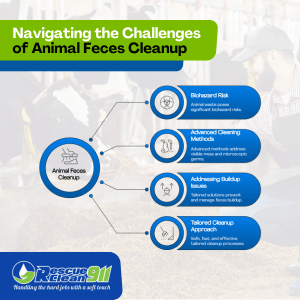 Rescue Clean 911 seals all biohazard material from animals and people and disposes of it in accordance with local requirements. We then use a range of methods to eliminate bacteria on surfaces and remove the odors that remain afterwards.
Rescue Clean 911 seals all biohazard material from animals and people and disposes of it in accordance with local requirements. We then use a range of methods to eliminate bacteria on surfaces and remove the odors that remain afterwards.
Our goal is to remove all the signs that a death occurred on the property, including any animal waste that accumulated before the incident was discovered. This can prevent any loss in property value or uncomfortable reminders of the event.
Neglect
Property neglect is common in hoarding properties, but can happen even without hoarding being present. Certain lifestyles, physical disability, depression, or another factor can make it difficult or impossible for a homeowner to clean a property. Animal feces can go uncleaned, where they ultimately build up and become a more serious health issue.
There is also the potential for animal neglect, where the animal itself is either uncared for or improperly cared for. In these cases, not only are there feces, but the animal itself may be more likely to be sick, resulting in even further risk of illness.
Once the lack of property maintenance or the animal neglect case is managed, we can fix the physical and cosmetic damage caused by animal feces and restore the property to like-new condition.
Animal Infestation
South Florida is home to a variety of wildlife pests like rats, mice, bats, birds, raccoons, and squirrels. Any of these can build a nest inside a home and reside there for anywhere from months to years. During this time, they will leave droppings scattered around the nesting area and the places they travel in the property.
After the animals are removed by a pest control company or they leave on their own, the droppings and the bacteria they contain remain. They can lead to respiratory infections, parasites, and other challenges years later. Even when the animal nest was away from communal areas, hiding in places such as an attic or storage room, the germs can eventually migrate into the living spaces of a property.
We collect the animal droppings and any contaminated materials that cannot be cleaned, such as insulation, and dispose of them safely.
Then we clean and sanitize the area. Due to the risks of airborne particles during this process, we implement various precautions to prevent cross-contamination in other areas of the property and then restore the property to its original appearance.
Jump to a section:
How We Clean Up Animal Feces
The process needed to remove traces of animal feces will vary depending on what other challenges exist and the scope of the problem. For example, hoarding situations may require sorting through the amassed items first or performing a move-out of all items so the entire property can be sanitized before belongings are put back.
In general, the specific process for cleaning up after animal feces includes:
Secure the Area and Implement Safety Precautions
Remove Feces and Contaminated Items
Sanitize and Disinfect
Restoration of Any Damages
The technology, detergents, biocides, and antimicrobials we use to sanitize surfaces are all eco-friendly. The majority of cleaning we perform is inside, and we want to be sure that the property is left safe afterwards without the risk of introducing further dangerous chemicals. Instead, our cleaning equipment and methods safely work with a majority of surfaces and materials to kill bacteria, remove odors, and leave a property fresh.
Technicians with Rescue Clean 911 have received extensive training in crime scene cleanup and in the use of various chemicals, all of which are OSHA approved and completely safe to you and your family.
In conjunction with specialized training in the detection and removal of bio-hazardous materials, our technicians will restore your house or place of business to a safe environment.
Rescue Clean 911 works with several different insurance companies; therefore, we are often able to bill your insurance company directly.
If insurance covers the cost of our services, the only payment required from you will be your policy deductible.
If insurance coverage is not available, we do offer several different payment plans, which generally suit most budgets.
We provide service to the entire South Florida area, including Dade, Broward, Palm Beach, St. Lucie, and Martin counties.
What Makes Animal Waste a Problem?
Animal and wildlife feces, especially outdoors, are a common issue that is not typically a health concern. Most pet owners are lax on how often they clean up after their pet, and the occasional wildlife droppings in the grass are not necessarily cause for worry.
But indoors, animal droppings can cause more serious challenges – especially here in the Miami, Fort Lauderdale, Boca Raton, and surrounding region.
In very small amounts (for example, a dog that had an accident on the floor), most feces can be quickly cleaned up and removed. But there are many situations where the buildup can become problematic and fast. These include:
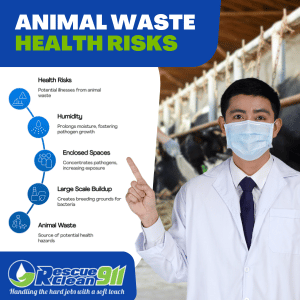 Large Scale Buildup – While a little bit of feces can be cleaned and removed, larger-scale buildup can cause significant challenges. When piled atop each other, feces are unable to dry and are more likely to grow harmful bacteria or spread pathogens.
Large Scale Buildup – While a little bit of feces can be cleaned and removed, larger-scale buildup can cause significant challenges. When piled atop each other, feces are unable to dry and are more likely to grow harmful bacteria or spread pathogens.Enclosed Spaces – Outdoors, feces have a chance to breathe, so pathogens dry out or disperse. But indoors, especially in enclosed spaces, the pathogens build up and linger, which means a far greater chance of illness.
Humidity – If we lived somewhere with drier air, some feces would be able to dry out and ultimately deteriorate. But with our humidity, the feces can stay moist for longer, allowing bacteria, fungi, and other particles to thrive.
It doesn’t take long for animal waste to quickly turn into a dangerous and unpleasant problem, especially if it occurs inside the property and in high amounts. Animals will regularly relieve themselves, so any animal that spends any length of time indoors will result in a buildup of feces and urine.
Over time, this type of buildup carries more and more risks. Eventually, those on the property are at risk for:
Illnesses – Feces can contain hundreds of microorganisms that can cause dangerous or fatal diseases in humans. Germs can be inhaled, contaminate food, or even absorbed through the skin. These illnesses can also spread, especially if disturbed. The microscopic pathogens can be spread by contact or through the air throughout the property.
Odors – Bacteria and sulfur-containing compounds formed during the digestion process give animal excrement an intense smell. These bacteria and compounds saturate surfaces. In the case of urine or liquid excrement, the odor-producing elements can even be soaked beneath the surface, into carpets, carpet padding, wood, upholstery, and other porous materials. Even after waste is cleaned, invisible bacteria can remain behind and continue to produce odors.
Staining – Animal droppings can lead to staining on carpets, wood flooring, furniture, clothing, bedding, walls, and other surfaces. Acids in excrement can wear away paint or eat through surfaces. Staining is another issue that will last indefinitely after animal waste is removed unless cleaning methods are employed that can get to the set-in stains.
Pest Infestations – Whether the animal droppings are from your own pets or the result of a wildlife infestation, the waste is going to contain pheromones. These chemicals have the potential to attract animals of the same or other species, meaning you could see recurring rodent, bat, or similar infestations. Many species of flies are also attracted to the decaying organic matter in animal waste. The flies can promote the spread of disease by transferring bacteria from the feces to food and prep surfaces.
Over time, animal feces will decompose. Dog poop, for instance, can take an average of 2 months to completely disintegrate outdoors in warm weather. Cooler indoor conditions and less exposure to the sun can make this process take even longer. Other animals, like bats, squirrels, and similar wildlife, can have droppings that pile up on top of each other, making it impossible for the waste to deteriorate.
The problems with animal feces increase both with the amount of buildup and the exposure time. The amount of waste buildup heightens the risk of touching, ingesting, or inhaling a pathogen. The more time waste is permitted to sit, the more opportunity for embedded staining and smells.
Even after animal waste has decomposed so that it is no longer visible, bacteria can remain on surfaces or in the air for months afterwards. Odors and staining can also be more permanent unless advanced cleaning methods are used to remove existing waste and all traces of feces and urine.
Jump to a section:
Diseases Transmitted by Animal Feces
Feces can carry diseases, both at the time that the animal relieves itself and the longer it is allowed to sit. Some of these are bacteria-related. Others are zoonotic diseases – diseases specifically spread from animals to people. For example, dogs and cats alone are capable of spreading several common diseases:
Giardia – This parasite spreads from fecal matter into water and is not visible to the human eye. When the infected water is consumed, the symptoms include intestinal upset, often lasting two to six months or longer.
E. Coli – Most common in livestock but with the potential to be present in a variety of animals, this bacterium can cause nausea, vomiting, diarrhea, and fever. In extreme cases, it is deadly. The animals that carry the E. coli bacteria often show no symptoms.
Campylobacteriosis – The Campylobacter bacteria cause abdominal pain, fever, and diarrhea in people. If it enters the bloodstream, it causes a dangerous infection.
Salmonella – This bacterial infection is the most common zoonotic disease and includes symptoms of headaches, muscle aches, and vomiting.
Roundworm – Roundworm, hookworm, and whipworm spread as eggs or larvae. From the digestive system, the larvae move into the bloodstream to reach the lungs, liver, heart, eyes, and brain. Larvae in the eyes can lead to blindness.
Tapeworms – In addition to being ingested, a tapeworm can move from animal waste to a person through the pores of the skin. As a parasite, they take the nutrients and calories from the food their host eats, leading to unhealthy weight loss and nutrient deficiencies that cause a multitude of health problems.
Toxoplasmosis – Spread by cats, the parasite is particularly dangerous for pregnant women as it can cause birth defects. It can also cause illness in people and animals.
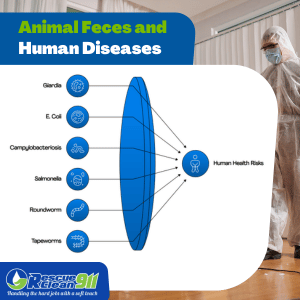 Farm animal or livestock waste can have additional pathogens in it. While these animals do not often live inside a property the same way cats or dogs may, animal infestations in livestock habitats can be extensive enough to require professional cleanup.
Farm animal or livestock waste can have additional pathogens in it. While these animals do not often live inside a property the same way cats or dogs may, animal infestations in livestock habitats can be extensive enough to require professional cleanup.
A livestock property that does not practice proper sanitation and cleaning practices may also have fecal matter tracked inside.
Wildlife also exposes properties to a variety of infectious particles and bacteria. Bat and bird droppings, for example, are breeding grounds for the fungi that cause histoplasmosis, which enters the air and can cause severe respiratory issues when inhaled.
Mice, rats, squirrels, raccoons, and other animals that may infest a home can spread the potentially fatal hantavirus and other illnesses through their droppings, leading to problems even years after they are removed or eliminated.
Feces may be immediately infectious, in the case of Giardia or bacteria like Salmonella, or may take some time to become active, such as roundworm eggs that are only infectious after 7 or more days.
How long bacteria and parasites can survive in feces also depends on the type and the ambient temperature of the environment. Some can last for days. Roundwood can be dangerous for years.
Over time, the poop will dry out and turn to dust. This does not make it any safer. Instead, the dust and bacteria particles can disperse, covering the area where the waste is and spreading into adjacent areas as airborne pathogens.
The risk of disturbing particulate matter is a concern during cleanup when animal waste is secured and disposed of. During the process, dust may be released into the air. With professional animal waste cleanup, we have safety procedures to protect our team from inhaling any bacteria and to keep the dust from spreading.
Don’t risk exposure to dangerous bacteria, parasites, or airborne pathogens. Contact us today for safe, certified animal feces cleanup and disease prevention.
Property Types We Work With
At Rescue Clean 911, we are experienced in supporting all types of properties in the Fort Lauderdale and Miami areas through a variety of cleanup processes. We understand how specific needs and concerns can vary between residential and commercial properties, as well as how animal waste can impact individual properties.
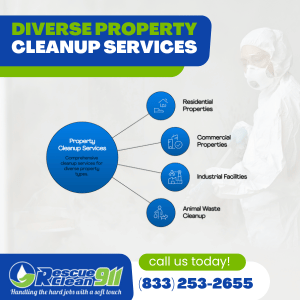 We also have the resources to safely clean the various kinds of animal waste that are left on properties with cleaning options that are capable of rectifying the most extensive collections of animal waste, odors, stains, and dangerous bacteria. We can clean:
We also have the resources to safely clean the various kinds of animal waste that are left on properties with cleaning options that are capable of rectifying the most extensive collections of animal waste, odors, stains, and dangerous bacteria. We can clean:
Single Family Homes
Multifamily Residential Properties
Commercial Properties
Industrial Facilities, and More
At any type of property, cleaning up after animals can be delicate, as many homeowners, business owners, and property managers want to keep the knowledge that there was a problem as limited as possible. When necessary, we use discretion when cleaning your property and work quickly so that no one has to know that you’re getting support.
24-Hour Emergency Services at Rescue Clean
When you discover any type of mess on your property – especially one that can potentially make you sick – you will likely want to take action immediately. Some situations that involve animal feces can also require immediate attention, such as an unattended death.
Rescue Clean 911 is a 24/7 clean-up company in South Florida. Day or night, we are here to take your call and send a team to your property to begin the cleaning process.
The 24-hour schedule also allows us to visit your commercial property or apartment complex with greater discretion if necessary.
Remove Animal Feces from Your Property – Contact Rescue Clean 911
As a biohazard, cleaning up animal feces is a process that requires professional assistance. Rely on a company with years of experience, transparency, and the most effective cleaning strategies.
Rescue Clean 911 works with residential and commercial properties anywhere in South Florida. With our full-service disaster cleanup and property restoration options, we can remove animal feces and assist you with any of the problems that have led to the waste in your home, apartment, business, or office until your home, apartment, business, or office is back to normal.
Call us today at (561) 782-1392 to speak with a member of our team or to get immediate assistance for an animal feces cleanup.
Jump to a section:
What Our Customers Are Saying
When Is Biohazard Cleanup Necessary?
While we might come into limited contact with germs everyday, biological waste is considered dangerous when significant amounts of debris are present, and can become more so the longer it is allowed to sit on your property.
How Our Biohazard Remediation Services Work
For most of our services, we can begin as soon as you call us. The only exception is crime scene cleanup or scenes where first responders are present, when we must first wait until the authorities “release” the scene or authorities have handled injuries or bodies. We can begin supporting you before that time, however, by letting you know what to expect during your service.
What are the Risks of Contamination with Biomaterials
The specific contaminants present at a biohazard site will vary based on the type of incident. Those most common, and with the most potential for danger, are:
- Blood Borne Diseases – HIV, Hepatitis B, and Hepatitis C can be transmitted through infected blood. Combined, these diseases result in thousands of deaths each year and any exposure to blood or bodily fluids can increase the risk of becoming infected.
- Bacteria – Sewage, decomposing tissue, hoarding situations, and other biological debris can carry a range of bacteria. Those people are most often familiar with include Streptococcus, E. coli, Salmonella, and Shigella, although there are dozens more. These bacteria can result in severe sickness if they are accidentally ingested.
- Infectious Disease or Viruses – With coronavirus continuing to be a concern at many homes and businesses in the foreseeable future, sanitizing completely after exposure to COVID-19 or any other contagious pathogens limits the spread of illnesses.
Rescue Clean 911’s team of certified technicians are on-call 24/7, and will respond quickly no matter when disaster strikes. We understand how critical it is that cleanup begins as soon as possible to limit the damage to your property, and will be there as soon as possible, day or night.
